Transversal Project 4: Interdisciplinary Risk Research
Risks play a major role in the social discussion of waste management. Here different risk concepts and risk estimations are encountered. This transversal project contributes to the risk based evaluation of waste management options from the view of different disciplines and stakeholders.
Project management
- Dr. Anne Eckhardt, risicare GmbH
Participating institutes
- Institute of Disposal Research, Clausthal University of Technology
- Institute for Radioecology and Radiation Protection, Leibniz Universität Hannover
- risicare GmbH
- Institute for Technology Assessment and Systems Analysis (ITAS) at the KIT
Work Package 4.1: Long-time Security of Deep Geological Storages
Objective
Developing a software platform for the numeric modelling of processes relevant to safety in deep geological repositories. It is intended for the use in education, training and research.
- modelling of thermal, hydraulic, mechanical, chemical processes (THMC); management of calculations with „external codes“
- uncertainty Quantification – probabilistic approaches
- quality controlled data management
- connected to WP 5.1,5.2, 5.3
- input for WP 4.2, 4.3
- used in the VP 3.5 and 3.6
WP Management
- Prof. Dr. Klaus-Jürgen Röhlig, Institute of Disposal Research, Clausthal University of Technology
Participating Institutes
- Institute of Disposal Research, Clausthal University of Technology
Work Package 4.2: Comparing the Radiologic Hazard of Different Waste Management Options
Objective
Nuclear waste management options which enable retrieval require a different handling of the waste containers. Depending on the effort and the possibilities of remote handling this leads to a certain exposure to radioactivity of the involved workers.
- The anticipated dosage is to be estimated for representative model scenarios of each waste management option.
- Additionally the strongly increased risk of migration of radionuclides from a storage near the surface is to be taken into account, if no retrieval will take place though this kind of storage is particularly intended for a short period of storage and retrieval.
- Additionally the risk of exposure in the case of possible reconditioning after retrieval or recovery is to be analyzed.
Connected to WP 1.1, 4.1, 4.2, 4.3, 4.5, 6.2, 6.3
WP Management
- Prof. Dr. Clemens Walther, Institute for Radioecology and Radiation Protection, Leibniz Universität Hannover
Participating Institutes
- Institute for Radioecology and Radiation Protection, Leibniz Universität Hannover
Work Package 4.3: Interdisciplinary Risk Research
Objectives
Wide analysis and weighing up of risks to compare and assess different waste management options.
- scenarios of future development and the scope of waste management options and its variants
- analysis of the discussion about security, classification of risks and evaluation criteria
- comparative analysis of security objectives
- institutional organization / long-term stewardship
WP Management
- Dr. Anne Eckhardt, risicare GmbH
Work package 4.4: Radionuclid Source Terms for different Waste Disposal Options
Objective
Developing radionuclide source terms for different waste disposal options. Radionuclide source terms are considered as upper limit concentrations for radionuclides. Source terms might be taken as possible risk indicators.
- Definition of chemical /geochemical boundary conditions assuming water intrusion into a deep geological storage or a long-term intermediate storage facility near the surface.
- Determining the maximum of radionuclide concentrations for selected scenarios and waste disposal concepts.
- Estimation of the radionuclide migration through repository barriers.
- Connection to WP 4.1, 5.1 and 5.2.
- Application of data in WP 4.2, 4.6, 5.3
WP Management
- Prof. Dr. Horst Geckeis, Dr. Volker Metz, Institute for Nuclear Waste Disposal (INE) at the KIT
Participating Institute
- Institute for Nuclear Waste Disposal (INE) at the KIT
Work package 4.5: Individual Dosimetry for Employees in Waste Management Facilities
Objective
Estimating the individual radiation exposure of employees during certain work processes in nuclear waste disposal facilities.
- MCNP-modeling of radiation fields in radioactive waste disposal facilities
- Describing work processes (e.g. retrieval) with process simulations and MCNP-modeling
- Estimation of radiation exposure for certain work processes and thus the individual dose to employees
- Developmentof adapted dosimetry strategies and optimizationof radiation protection measuresConnectionto WP 4.2
WP Management
- Prof. Dr. Horst Geckeis, Dr. Frank Becker, Institute for Nuclear Waste Disposal (INE) at the KIT
Participating Institutes
- Institute for Nuclear Waste Disposal (INE) at the KIT
Work Package 4.6: Influence of Radionuclide Speciation on Transfer Factors
Objective
To determine the radioactive hazard for human beings by radionuclide migration from a final storage it is essential to consider the input of radionuclides into the food chain. Therefore the transfer factors must be known.
- The dependence of transfer factors from the consistency of the soil, mineral content and fertilization are to be analyzed.
- For representative useful plants the influence of speciation of the radionuclides themselves, especially the oxidation state, chemical bonds etc. are to be analyzed.
· Connected to WP 2.3, 4.1, 4.2, 4.4
WP Management
- Prof. Dr. Clemens Walther, Dr. Laura Lütke, Frank Tawussi, Institute for Radioecology and Radiation Protection, Leibniz Universität Hannover
Participating Institutes
- Institute for Radioecology and Radiation Protection, Leibniz Universität Hannover


